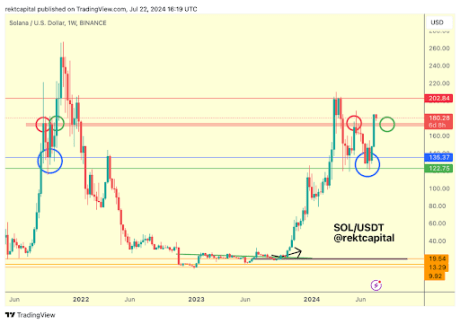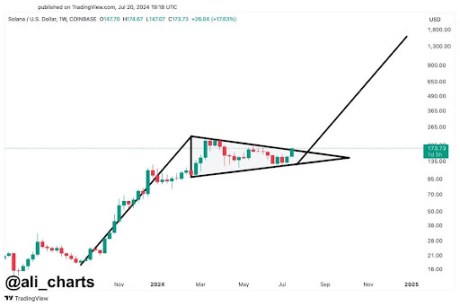Major Listing Propels This Solana AI-Based Token To New Peaks Beyond $5: Is it Time To Buy?
Solana-based altcoins and artificial intelligence (AI)-based coins have seen a surge in investment and price appreciation in recent months. Among the notable winners is io.net’s native token IO, which surged above the $5 mark and saw a substantial 50% increase within hours of a major listing announcement.
What Drives Investor Interest In io.net?
The world’s largest cryptocurrency exchange, Binance, revealed that io.net would be added to various platforms, including Binance Simple Earn, Binance Convert, Binance Margin, Binance Futures, and Binance Auto-Invest.
This listing news sent IO to a record high of $5.99, making it one of the top gainers among Solana-based tokens. However, the recent surge in IO’s price and investor interest begs the question: What is io.net, and why are investors flocking to this token?
At its core, io.net aims to establish a globally accessible and decentralized cloud computing network. This network reportedly provides affordable, flexible, and permissionless access to compute capacity, specifically targeting the increasing demand for GPU power driven by the rapid growth of AI applications.
One of the main propositions of io.net lies in addressing the challenges faced by traditional cloud computing infrastructure, including high costs, limited availability, and long wait times.
io.net tackles these issues by aggregating GPUs from underutilized sources such as independent data centers and idle crypto mining farms. By leveraging these resources, io.net offers computing power at significantly reduced costs—up to 90% less than centralized providers.
IO Token Sales And Economics
io.net leverages distributed computing libraries to facilitate parallel training. Training models on a single device often leads to bottlenecks due to CPU/GPU memory limitations.
However, io.net overcomes this challenge by orchestrating and batch-training jobs across multiple devices, using data and model parallelism to improve training efficiency.
Additionally, io.net supports reinforcement learning (RL) workloads by employing an open-source RL library. This feature easily enables the development and deployment of complex RL models, utilizing a simple set of application programming interfaces (APIs).
Regarding token sales and economics, io.net has a strategy to ensure the steady and controlled distribution of tokens, promoting long-term stability and growth of the ecosystem.
The initial circulating supply upon listing on Binance is 95,000,000 IO tokens, accounting for 19.00% of the Genesis supply. The maximum token supply is 800,000,000 IO tokens, with allocations for private sales, public launch, team and advisors, and ecosystem treasury.
Solana-Based Tokens PerformanceWhen writing, the Solana-based token IO is trading at $5.67. It remains to be seen if the current uptrend will be sustained over time after the initial hype surrounding the Binance listing.
Notably, the token has quickly reached a market capitalization of $543 million, indicating a significant influx of investment into the newly launched IO token.
Alongside IO, another Solana-based token, dogwifhat (WIF), has also experienced a recovery after a sharp correction in the past week. WIF has regained the $2.68 level and recorded a 6% uptrend in the last 24 hours.
In the case of Solana itself, the cryptocurrency is currently trading at $156, reflecting a 5.5% increase within the 24-hour timeframe. However, the fifth largest cryptocurrency in market capitalization, over $72 billion, has experienced a price decline of nearly 10% over the past seven days.
Featured image from DALL-E, chart from TradingView.com


